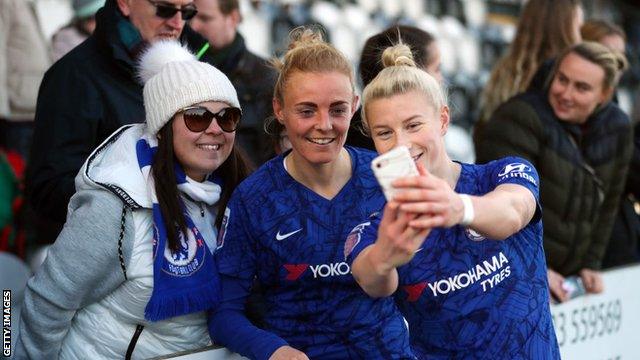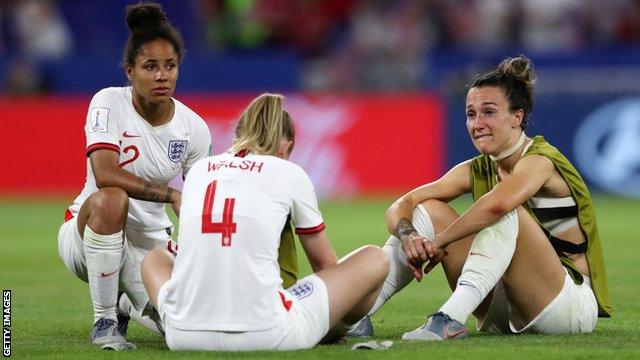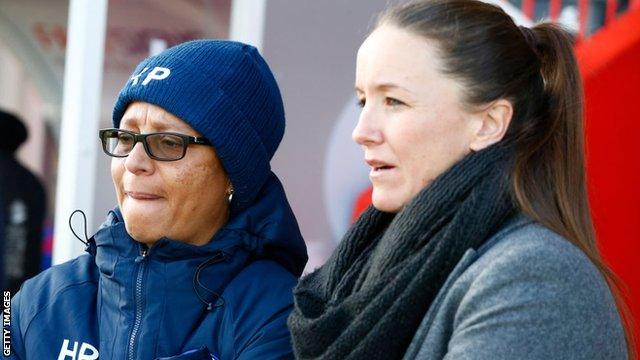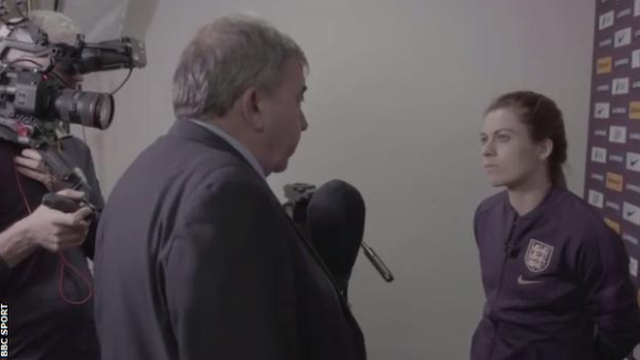Can the WSL deal with pressures of growing visibility?
- Published

Wales captain Sophie Ingle and Chelsea team-mate Beth England pose for a selfie with fans at Kingsmeadow
Crowds are up, television coverage has increased and sponsorship deals are becoming more lucrative - but there are side-effects to the growth of top-level women's football.
Players in the Women's Super League are having to deal with greater levels of expectation, and with that can come stinging criticism.
England boss Phil Neville has suggested in the past that such scrutiny comes with the territory. But how do players cope when they have not been used to it?
And are Women's Super League clubs equipped to support them?
Can players handle criticism?

England internationals Demi Stokes (left), Keira Walsh (centre) and Lucy Bronze (right) react to their World Cup semi-final defeat by the USA
Neville said last June that his team should be "brave enough" to accept criticism in the build-up to the World Cup, at which his team reached the semi-finals.
"There's always been this real 'nicey nicey' approach to the women's game and I'm of the opinion that if you win, you get praise, but if you do a bad pass, then you are going to get criticised," he said.
A record-breaking 28.1m people watched BBC coverage of the 2019 World Cup on television and online.
But Manchester City and England midfielder Keira Walsh told the Guardian, external in January she "probably underestimated how much attention was going to be on the games".
She said: "I really did struggle with the criticism off the back of [the World Cup]. There were times when I thought: 'Is this actually for me? Do I want to play football any more?'
"Sometimes people are very critical of me, which is fine, I can learn to deal with it, but people do tend to forget that I've still got time to improve and this isn't the finished product by any means."
It is a product, though, that is attracting ever more attention - which will bring scrutiny and criticism along with a major financial lift.
Atletico Madrid forward Toni Duggan told BBC Breakfast in May last year that the game had been "screaming out for sponsorship, interviews and brands coming on board".
Both the sponsors and the fans are doing just that. Last year, Barclays agreed a multi-million sponsorship deal with the Women's Super League. And after the publicity generated by the World Cup, England played in front of a record crowd of 77,768 against Germany at Wembley in November.
"The product on the pitch has become better which makes fans come in and want more," departing Manchester City boss Nick Cushing told BBC Radio Manchester.
Has this level of pressure always been there?

Former England manager Hope Powell (left) and ex-Lionesses captain Casey Stoney now manage clubs in the WSL
Manchester United manager Casey Stoney, a former England captain, says "the women's game isn't used" to the visibility.
Asked if there is more criticism of players now, she replied: "I think there is, and I think that should be what we want, because we want visibility and we want people to judge the game for the game, rather than saying: 'Oh, unlucky.'"
Wales international Hayley Ladd added "a little bit of criticism is normal".
"You see what the men have to put up with in their side of the game," she said. "If things do turn a bit negative then we have to stay focused on our jobs, so we might not read that."
How do clubs support players?
A number of clubs in the WSL provide social media training in order to help players manage criticism online. They also carry out media training sessions at the start of the season.
Mental health support is provided at Everton, who employ a club chaplain, a performance psychologist and a lifestyle adviser. The Toffees' players can also use a club doctor and external clinical psychologists.
Liverpool invited a consultant in leadership, team culture and elite performance to speak to the players before the Merseyside derby at Anfield in November.
Manchester United have an external wellbeing coach, who comes into the club every day.
They have also had someone come in to talk about social media and the club provides one-to-ones with players every six weeks to discuss personal issues, as well as their football development.
Players also receive support from the Football Association.
Every club is visited by FA officials during pre-season to discuss how to report abuse or discrimination and players are made aware of self-referral mental health support programmes.
WSL academies are given workshops on mental health and there are plans in place to introduce a mental health first aider at every club.
Assistance in dealing with publicity is given too, as a BBC documentary showed last June; the programme showed the England squad taking part in media training and team bonding sessions in Qatar before the World Cup.
All of those programmes can help players deal with the criticism that comes their way.
"It's not about patronising people - it's a football game, and we don't want to be treated any differently from the male players," Stoney said.
"You're going to get the same judgement. The difference is: the male players are used to it. The women's game isn't used to it, and it's a big wake-up call for a lot of [the players] because they read it."

BBC Sport commentator Jonathan Pearce with retired midfielder Karen Carney doing a mock interview